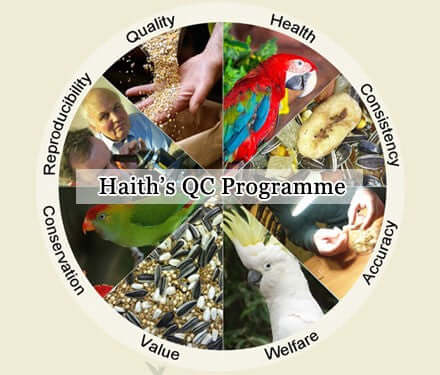
RZSS & Haith's Share Developments in Avian Nutrition with World Pheasant Association
Share
Andy Beer (Royal Zoological Society of Scotland) and Simon King (Haith's) attended the World Pheasant Association's Conservation Breeding Advisory Group Avicultural Day (at Cotswold Wildlife Park) Saturday, 7th February, 2015
WPA Conservation Breeding Advisory Group Avicultural Day
Saturday, 7th February, 2015
 Andy Beer - RZSS Nutritionist
Andy Beer - RZSS Nutritionist
Andy Beer (RZSS Nutritionist) and Simon King (Associate Director of Haith's) were invited by John Corder (Acting Chairman - WPA) to give an update on recent advances in dietary analysis brought about by the collaboration project launched in 2013.
Andy Beer opened the presentation by dismissing the myth that spinach is high in iron and sharing that it was "German scientist, Emil von Wolff, who misplaced a decimal point when calculating spinach's iron content in 1870."
Andy then went on to discuss that the merits of feeding Spinach weren't that great as, "only 5% of Ca from Spinach is absorbed because of the oxalic acid. Notably, in broccoli 50% is absorbed." This was information well-received when standard protocol is to encourage bird-keepers to feed greenfood.
Andy gave a brief background to the RZSS/Haith's bird diet collaboration to WPA delegates and then introduced Haith's Simon King.
Many WPA members already use Haith's Red Band Pigeon Conditioner and are fully aware of its SuperClean merits - indeed WPA's John Corder shared a video of his birds eating Haith's Red Band. However, Simon shared one or two lesser-known facts about Haith's; such as that Haith's founder (John "Ted" Haith) was originally a Senior Zoo Keeper and enthusiastic aviculturist, which is in fact where his passion for SuperClean seed came from.
Simon shared details of Haith's QC Programme and how it was introduced to answer Professor John E. Cooper's question: "Is there a need for quality control of bird diets?"
 The Cornerstones of Haith's QC
The Cornerstones of Haith's QC
A number of WPA delegates were surprised to hear that dust is harmful to a bird's respiratory system and extraneous husk can damage delicate tissues and allow entry of pathogens.
Simon shared this slide:
 Uncleaned bird food on blood agar plate
Uncleaned bird food on blood agar plate
To illustrate what happened to an uncleaned diet when it was placed on a blood agar plate. (Please note: this bird diet was purchased from an advert placed in a national paper).
The agar plate shows: “Far more bacteria and fungi (in terms of both numbers of colonies and species of organism) have grown from the dry mix than would be expected from a properly cleaned diet,” – Professor John E Cooper.
Andy Beer (RZSS) discussed the merits of the bird seed analysis and shared illustrative slides documenting progress, such as:

The slides shown illustrate how close replicants are (using The FOss XDS NIR) compared to laboratory analysis.

Andy explained that products like Prosecto Insectivorous are being put through their paces and being analysed for Ca, P, Fe as well as Protein, Fibre, Ash, Fat, Starch et cetera. We know more than we've ever known about seeds; however, the bird seed industry (generally) knows very little about seed nutrition and Haith's acknowledged the key role Andy Beer/RZSS are playing in this collaboration.
Zoos are largely overlooked for the role they play in international conservation and here is a project that is being governed by one of the country's leading zoos and the benefits will be felt by captive and wild (free living) birds throughout Europe.
The collaboration focused on Red Band as this was after all an event attended by experienced/expert bird-keepers and bird-breeders.

Red Band is used by many pheasant breeders and is also used by zoos across the UK so understanding its nutrition merits is important to Haith's/RZSS.
Applications of Red Band:
• Main proprietary use as a ‘conditioner’ for racing pigeons.
• Used by many Galliforme breeders as a means of increasing energy intake pre-breeding.
• Potential as a ‘quality feed’ for conservation Galliformes.
The Future:
RZSS & Haith’s will continue the collaboration and seek to develop and refine specialist combinations of seed to maximize the nutritional benefits for species of endangered birds within conservation breeding programmes.
Benefits to bird-keepers: bird diets created by science and know-how, diets improved with collaboration.
Thank you to John Corder and WPA for inviting us to the Avicultural Day at Cotswold Wildlife Park. And thank you also to Cotswold Wildlife Park staff (especially Louise Peat and Estelle) for being such good hosts.
You can find out more about WPA online (membership options are available).
Cotswold Wildlife Park, Burford, Oxon.

